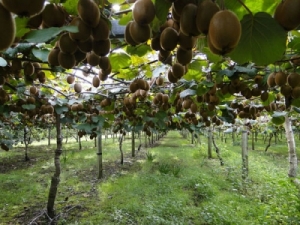Methane campaign is 100% politics
OPINION: We are endlessly told that livestock are responsible for half of New Zealand's total emissions.
 How profitable do you think the kiwifruit industry would be without a strong science and promotion budget?
How profitable do you think the kiwifruit industry would be without a strong science and promotion budget?
At a forestry event last year a speaker talking about forest owners' spending on science asked, "How much does the kiwifruit industry commit to research?"
Given that our property grows kiwifruit -- and some sheep and beef -- I said "tens of millions" which drew laughter in the audience.
The speaker, addressing his question, said "$30 million to be precise compared to $3m by the forest industry," which brought gasps from some and silence from the majority.
We have an 8.2ha orchard so are a very small part of the total kiwifruit productive platform. The kiwifruit industry's science input benefits from our orchard by about $35,000 per year, based on an average per tray input.
Our orchard's contribution to sales and promotion exceeds $90,000 per year on a per-tray average. I am not privvy to the forest industry's budget, but I doubt it would exceed a few million dollars at best.
How would the red meat or wool sectors stack up in their contribution to science and promotion? Based on a vigorous discussion I heard during a post-duck shooting dinner several years ago, I suspect not great. The two sheep and beef farmers present were convinced I was being ripped off; they said it was not their responsibility to fund such items.
I suggest that the relative strengths and weaknesses of the various industries are in no small part directly linked to their commitment to science and promotion. Having said that, kiwifruit does have an advantage in having a 'single desk' status, which means that all inputs are for the good of all growers and not subject to freeloaders who contribute little but play on the benefits of those who do pay, as may be the case in the other sectors.
No doubt the topic will again arise at next Saturday's dinner. I will again be told I am being ripped off, and that the meat sector is underperforming.
It is a long time since wool warranted a discussion, which is unfortunate because if there is one rural product with a 'kiwifruit' or 'manuka honey story' to tell it must surely be wool.
But then my mates, and most of their compatriots, have clearly indicated they do not see the benefits of committing their hard-earned funds to put wool in the limelight it deserves through science and promotion.
And finally, how profitable do you think the kiwifruit industry would be without a strong science and promotion budget? It must be one of the most unappealing fruits, given its visual attributes. Consider why this fruit is the rock-star of the fruit bowl.
As with most of life, we reap what we sow, and I am happy to continue to fund the science and promotion of my industry.
• Ross Bawden farms at Pukehina, Bay of Plenty.
New tractor deliveries for 2025 jumped 10% compared to the previous year, a reflection of the positive primary sector outlook, according to the Tractor and Machinery Association (TAMA).
Entries have opened for two awards in the New Zealand Dairy Industry Awards (NZDIA) programme, aimed at helping young farmers progress to farm ownership.
Federated Farmers has confirmed interim chief executive Mike Siermans to the role.
Registrations are now open for the 2026 Ruralco Golf Classic, with all proceeds from the event set to support the Mid Canterbury Rural Support Trust.
Mating wrapped up last month at the across-breed Beef Progeny Test on Pāmu’s Kepler Farm in Manapouri.
Libby Judson is a keeper of memories from an age gone by. Tim Fulton tells her story.